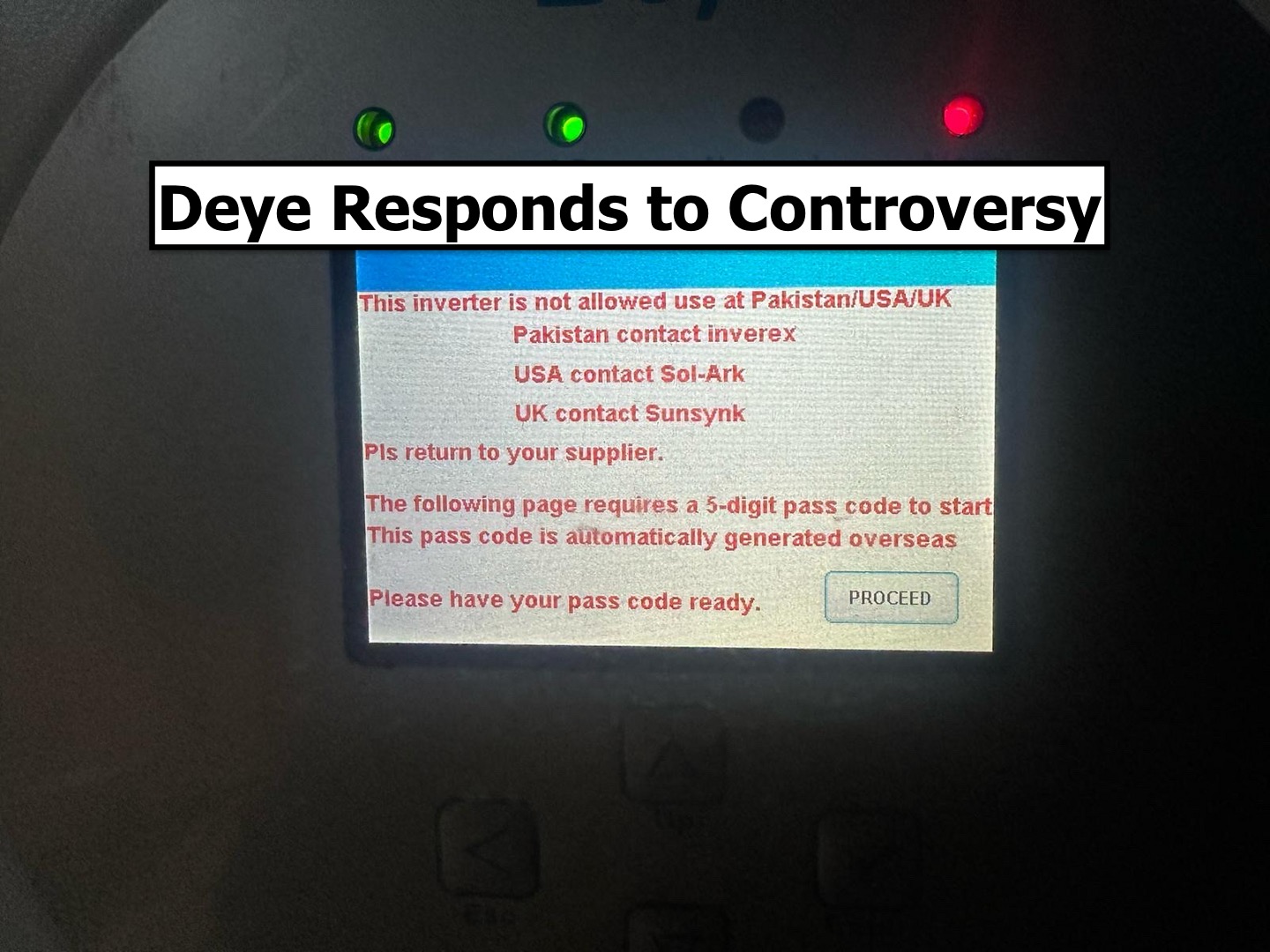On Friday, Nov 15th, we started getting reports of bricked Deye inverters in the US, Canada, and elsewhere. I asked Deye for comment before I published my original article, and only now, two weeks after the incident, did Deye get back to me with a comment.
It’s a fairly long statement, so I’m going to interject along the way to add context and harrumphs.
Recently, some users have reported instances of pop-up alerts on their devices.
To avoid any misunderstanding, Deye hereby issues the following statement:1.Region Where Pop-Up Alerts Occurred
Based on the current investigation results, very few inverters have displayed pop-up notifications, all of which are located in the United States. Devices in other regions are not affected by this pop-up.
According to reports, this doesn’t seem to be true. While it’s true that most reports I’ve seen are from Puerto Rico (I assume the gray market is strong there for these inverters), there have also been reports from Canada, and one I’ve seen from Panama. Perhaps there were casualties along the way, but it doesn’t seem like it was isolated to the United States.
2.Reason for the Pop-Up Alerts
Deye has not remotely controlled or interfered with your devices in any form. Currently, there is no evidence to suggest that these inverters have been maliciously remotely controlled via Deye’s cloud services.
Harrumph.
The contracts we sign with all dealers clearly stipulate that products that are not UL certified and listed by local power grid companies may not be sold or used in the United States, because the products do not meet US UL standards. If used in violation of this policy, the devices may pose significant-safety risks. To address this, Deye has built a verification mechanism into the devices. The pop-up alert is automatically triggered by the device’s authorization verification mechanism, rather than by any human intervention.
The inverters produced by Deye routinely perform automatic checks of their authorization status.. If the device fails the authorization verification, a pop-up alert will notify the user. The purpose of this is to ensure the device is used in compliance with regulations.
Now, this could be true, but I have a hard time with the idea that Deye inverters have performed this automatic check for longer than, say, two weeks. While Deye may not have maliciously (a word I haven’t used, nor do I think is accurate) remotely controlled the inverters, that doesn’t really eliminate the possibility of them remotely updating firmware to a version that starts performing these automatic checks.
If they were able to provide a timeline of when this firmware began making these checks and how long that firmware has been available for the inverters, I’d be more willing to believe the statement as given. However, the fact that there is no timeline given at all is, as the most professional journalists say, sus.
3.Statement on Sales and Technical Support in the U.S.
According to Deye’s current business policy, Deye does not directly export or sell Deye brand inverters to the United States, and it requires distributors not to resell Deye brand inverters to the U.S. Therefore, Deye is currently unable to provide technical support for inverters in the U.S. market.
4.Recommendations and Support
To ensure the normal use and service experience of the device, Deye recommends that users who see pop-up prompts contact your seller or contact Deye directly as soon as possible to obtain legal authorization.
The circulation of unauthorized devices disrupts the normal market order, potentially causing losses and risks for users who purchase unauthorized equipment, while also damaging Deye’s legitimate rights and interests.
Deye urges users to purchase legitimate devices through authorized channels to protect their legal rights.
While it’s still terrible that all of this happened in this way and that it wasn’t happening immediately upon installation of these inverters, this is probably the best response I could expect. It is objectively good to hold up their end of the exclusivity agreement they’ve signed with Sol-Ark and other brands. The sting of this statement is that the folks experiencing the pain of this alert probably bought the inverter from a dealer or installer who won’t answer their phone calls. Hopefully, there’s a resolution to be had for those people, who are caught in the gray-market crossfire.
5.Deye’s Commitment
Deye remains committed to maintaining market order and protecting the user experience and rights of all legitimate customers.
Deye places great importance on cybersecurity and privacy protection, having established a multi-layered, comprehensive information security defense system.
As always, Deye will continue to prioritize users and provide safe, reliable, and stable services and support.
I mean yeah, this is what a company SHOULD say, and all of them do. The fact remains, most internet-connected inverters can theoretically be subjected to something like this, and there’s shockingly little work being done in the field to create options where the owner of the inverter is the ultimate holder of the keys.
If you’re dealing with this issue in the United States or Puerto Rico, your best option is probably to take advantage of the discount Sol-Ark offers, which is active through the end of 2024. You can find those details in my previous article.
If you’re dealing with this issue outside of the United States, it looks like your best plan is to contact Deye directly to get the inverter activated again.

Leave a Reply
You must be logged in to post a comment.